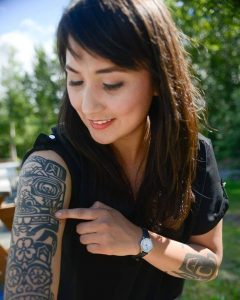During my FAI summer internship the facilitators held an Advancing dialogues on racial equity (ANDORE), dialogue with all the interns. The only question they asked was,” When was the first time you experienced racism”? It never dawned on me that I struggled with racism and it rarely came up in the conversations I had. I usually heard about Native people in a bad light and I did not know much about the history, politics, heroes, and well the culture. All that got me interested in digging for more information, because honestly I had no clue what it meant to be native and I wanted to find out.
I didn’t realize how much of of who I am is influenced by my culture and that I could develop my cultural identity and practice my culture to create a foundation of resiliency. The only regret I have now is that I didn’t reach out to the Elders more or my relatives for information or to teach me things. I wish I had made more efforts when I was younger to learn about my culture.
There is not much I can do about it now except do my best to learn and find the opportunities to connect with Elders and learn as much as I can, so I can pass that knowledge on. My goal in life is to help others explore, develop, and share their cultural identity, so they can heal and use their talents and skills to further the Indigenous community for the next ten thousands years.
It means revealing our identity to others; who we are, where we come from, our experiences that have shaped those things, and our intentions for the work we plan to do. Hence, “location” in Indigenous research, as in life, is a critical starting point. (Sinclair, 2003, p. 122)

